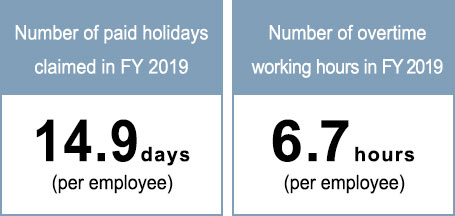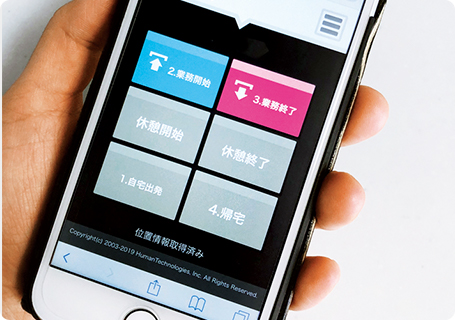Basic Idea
Today there is general concern in Japan that the declining birth rate and population aging will eventually lead to a serious labor shortage. Under such circumstances, whether or not a company can enjoy lasting growth largely depends on its ability to secure and train highly capable human resources regardless of their gender, nationality or age.
Based on the idea that distinctive products of high quality come from individuals with unique personalities, Nippon Shinyaku is committed to promoting human capital management that allows each employee to grow and diverse human resources to play an active role, as set forth in our Seventh Five-Year Medium-Term Management Plan. Our specific activities include implementing a human resources strategy that maximizes individual potential, acquiring and developing global talent, reforming our organizational culture, and realizing labor-saving through digitalization.
In 2018, we adopted a flextime system for MRs. Furthermore, in 2020, we began to apply the system to all employees (excluding production staff). We also conduct various activities, including a Challenge 100 activity, to increase our productivity and improve the way we work.
In addition, in consideration of the likely adverse impact of long working hours on employees’ physical and mental health, Nippon Shinyaku focuses on appropriately managing the working hours and has an industrial physician give guidance to employees who work a certain number of hours longer than the prescribed working hours.
As a countermeasure against overwork, the president delivers messages about the importance of enabling employees to maintain their good health and find satisfaction in both their work and life by drawing a clear boundary between their working time and their time off and reducing overtime. We provide employee training on managing working hours every year to enable employees to review their work styles, reduce overtime, and acquire correct knowledge about working hours. In addition, we monitor the actual state of operations in departments where employees often work overtime and stimulate their efforts to reduce overtime.
As a place for close communication between employees and the management team, the Labor-Management Council, which comprises members of the Standing Executive Committee and the Central Executive Committee of the labor union and the management team, meets quarterly. The council is intended as an opportunity for workers to put questions to the management team.
Upon salary calculation or the revision of the legal minimum wage, the amount of salary to be paid to every employee is checked to confirm that it exceeds the legal minimum. After that, the amount is determined and paid.
We also faithfully observe labor standard rules. This fiscal year, we were not involved in any violations against labor standards.
Moreover, our subsidiaries in the U.S. and China have been accelerating their efforts to recruit local employees, resulting in the number of local employees exceeding the number of overseas representatives sent from Japan at such companies.
Policy of striving to prevent overwork
We are striving to improve the efficiency of our operations through such measures as reviewing and reducing operations and promoting the use of digital tools. We also closely manage working hours to prevent overwork.
Policy of complying with minimum wage standards
We maintain our employees’ salary levels not only higher than the minimum-wage level but also enough to meet a certain living standard, strictly complying with salary-related laws, ordinances, and in-house rules.
Related Initiatives
Improving Life-Work Balance
At Nippon Shinyaku, we are striving to realize a workplace environment where all employees can work with a sense of ease while fully exploring their individual potential. For the workplace to be such a place for each one of the employees representing diverse traits and situations, it must be compatible with diverse modes of working. To this end, necessary support systems have been put in place and new arrangements introduced as the need be. We are continuing these initiatives, which we hope will also contribute to improving the employees’ Life-Work balance.

Working Modes
Flextime
In January 2018, Nippon Shinyaku introduced a flextime system for its medical representatives (MRs). This has made it possible for them to work in flexible manners that better accommodate their personal and family lives, enabling them to pick up children at nursery schools without delay, attend children’s school events, readjust their work schedule in consideration of their family members’ health, and so forth. Many have responded positively to the system, saying that it allows them to spend their time more efficiently than before.
In April 2020, the flextime system was expanded to cover all employees, except those in the manufacturing division. The system has helped increase employee productivity and improve their Life-Work balance.
MR rehiring
Nippon Shinyaku has launched an engagement system for MRs who leave the company for life-event-related personal reasons, such as moving due to marriage. When certain requirements are met, such MRs are registered as candidates for complementary training in preparation for rejoining the company to work as MRs again. As a result of system revision in January 2022, the requirements of prospective system users’ reasons for leaving the company and the jobs they have when leaving the company have been eliminated for the use of this system. In addition, advance registrations are no longer required. Former Nippon Shinyaku MRs to whom this system applies are now able to return to the company either on their own application or at the company’s request.
Telework
In January 2018, the company adopted a telework system that enables employees to work from home, especially to attend meetings with parties in different time zones or early in the morning or late at night. In April 2019, the telework system was revised and extended to employees working on the flextime system. Under certain circumstances wherein commuting is difficult due to reasons such as extreme meteorological conditions, suspended public transportation services, the employee’s light illness or injury, child care, or nursing care for a family member, eligible employees can work from home or in rental meeting rooms. With the onset of the COVID-19 pandemic, telework has become applicable to the maximum to prevent the spread of viral infection. In fact, the company has made the decision to continue promoting telework among all employees (except in the manufacturing division) even after the pandemic recedes so as to realize more efficient work performance and higher productivity.








